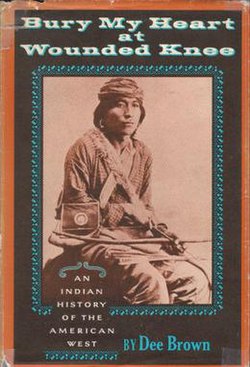
Back Погребете сърцето ми в Ундид Ний Bulgarian বেরি মাই হার্ট অ্যাট উনডেড নি Bengali/Bangla Bury My Heart at Wounded Knee Catalan Begrabt mein Herz an der Biegung des Flusses German Ehortzi ezazue ene bihotza Wounded Kneen Basque Haudatkaa sydämeni Wounded Kneehen Finnish Enterre mon cœur à Wounded Knee French Seppellite il mio cuore a Wounded Knee Italian 나를 운디드니에 묻어주오 Korean Bury My Heart at Wounded Knee (livro) Portuguese
 | |
| Author | Dee Brown |
|---|---|
| Language | English |
| Subject | United States history, Native Americans |
| Genre | Non-fiction Historical |
| Publisher | New York: Holt, Rinehart & Winston |
Publication date | 1970 |
| Publication place | United States |
| Media type | Print (hard & paperback) |
| Pages | 487 |
| ISBN | 0-03-085322-2 |
| OCLC | 110210 |
| 970.5 | |
| LC Class | E81 .B75 1971 |
Bury My Heart at Wounded Knee: An Indian History of the American West is a 1970 non-fiction book by American writer Dee Brown. It explores the history of American expansionism in the American West in the late nineteenth century and its devastating effects on the indigenous peoples living there. Brown describes Native Americans' displacement through forced relocations and years of warfare waged by the United States federal government as part of a continuing effort to destroy the cultures, religions, and ways of life of Native American peoples.[1]
Brown borrowed the book's title from the 1927 poem "American Names" by Stephen Vincent Benét: "I shall not be there. I shall rise and pass. Bury my heart at Wounded Knee".[2] Wounded Knee was the site of the last major attack by the US Army on Native Americans, and is one of several possible sites of Crazy Horse's buried remains.[3]
Helen Hunt Jackson's 1881 book A Century of Dishonor is often considered a nineteenth-century precursor to Dee Brown's book.[4]
Bury My Heart at Wounded Knee was first published in 1970 to generally strong reviews. Published at a time of increasing American Indian activism, the book has never gone out of print and has been translated into 17 languages.[5]
Before the publication of Bury My Heart..., Brown had become well-versed in the history of the American frontier. Having grown up in Arkansas, he developed a keen interest in the American West, and during his graduate education at George Washington University and his career as a librarian for both the US Department of Agriculture and the University of Illinois at Urbana–Champaign, he wrote numerous books on the subject.[6] Brown's works maintained a focus on the American West, but ranged anywhere from western fiction to histories to children's books. Many of Brown's books revolved around similar Native American topics, including his Showdown at Little Bighorn (1964) and The Fetterman Massacre (1974).[7]
- ^ Brown, Dee (2007). Bury My Heart at Wounded Knee. New York City: Henry Holt and Company. ISBN 978-0-03-085322-7. OCLC 110210.
- ^ Benét, Stephen Vincent (1927). "American Names". poets.org. Archived from the original on January 7, 2017. Retrieved January 6, 2017.
- ^ "Search For The Lost Trail of Crazy Horse". March 12, 2016. Archived from the original on March 12, 2016. Retrieved February 7, 2022.
- ^ Jackson, Helen Hunt (1985) [1881]. A Century of Dishonor: A Sketch of the United States Government's Dealings with Some of the Indian Tribes. Cambridge: Cambridge University Press. ISBN 978-1-4209-4438-9.
- ^ Momaday, N. Scott (March 7, 1971). "A History of the Indians of the United States". The New York Times. New York City. p. BR46.
- ^ Brown, Dee (January 1995). "A Talk with Dee Brown" (DOC). Louis L'Amour Western Magazine (Interview). Interviewed by Dale L. Walker – via www.stgsigma.org. (Interview conducted in Fall 1994.)
- ^ "Dee Brown (1908–2002)". Encyclopedia of Arkansas History & Culture. October 5, 2015. Retrieved April 9, 2013.